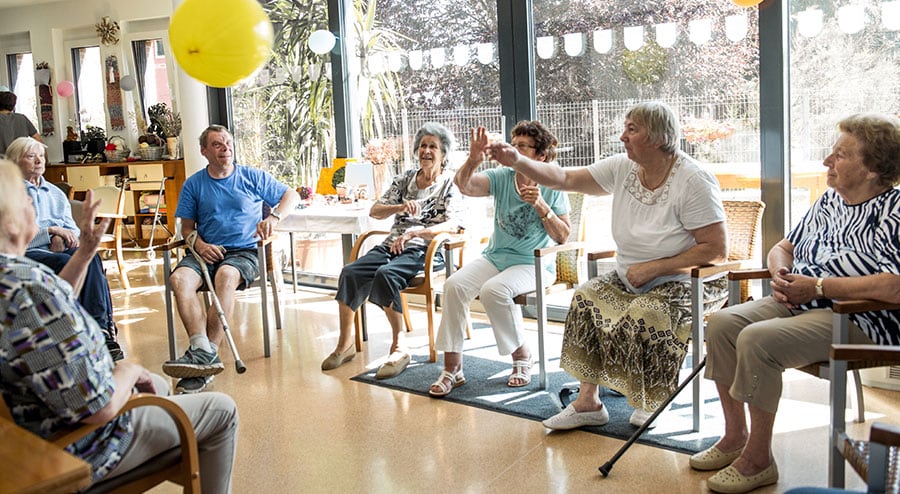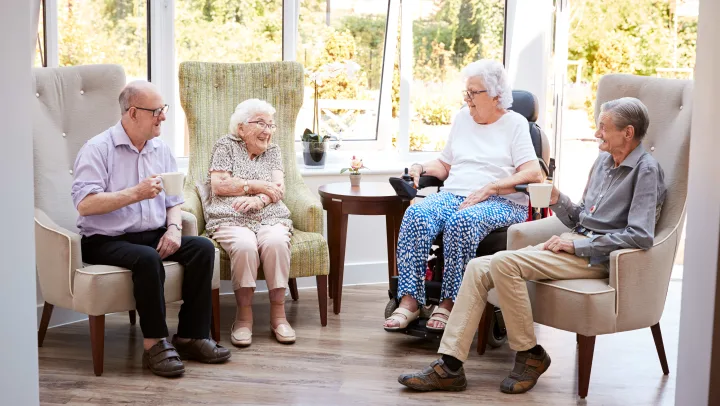Learn about tailored Assisted Living plans for elderly residents.
Learn about tailored Assisted Living plans for elderly residents.
Blog Article
Understanding How Helped Living Supports Individuals With Dementia Care Requirements
Assisted living facilities are increasingly acknowledged for their pivotal duty in attending to the complicated treatment requirements of patients with dementia. Memory Care. By providing an organized yet nurturing environment, these facilities not only advertise safety and well-being however additionally cultivate a feeling of autonomy through individualized care plans. Additionally, involving tasks and socialization possibilities are essential to boosting cognitive function and emotional health. However, the nuances of exactly how these components communicate to create an encouraging community warrant better assessment, especially in understanding their lasting effect on homeowners' lifestyle.
Overview of Mental Deterioration Treatment
Mental deterioration care is progressively important as the frequency of dementia-related conditions rises among maturing populations. The problem can vary substantially in its presentation, calling for tailored care methods to meet specific needs.
Effective dementia treatment involves a multidisciplinary method, integrating medical, psychological, and social assistance. Health care professionals, caretakers, and relative must team up to create a caring setting that promotes the wellness of individuals with mental deterioration. Trick components of dementia care consist of customized care plans, cognitive excitement treatments, and behavior treatments targeted at enhancing lifestyle.
Additionally, it is vital to identify the emotional and mental challenges faced by both individuals and caretakers. Education and learning and training for caretakers play a pivotal role in promoting understanding and empathy, thus enhancing interactions with those influenced by dementia. As the need for dementia treatment continues to rise, the emphasis must continue to be on delivering compassionate, person-centered care that respects the dignity and preferences of people coping with this condition.
(Assisted Living Charlotte)
Duty of Assisted Living Facilities
Helped living facilities play a crucial role in giving treatment for individuals with mental deterioration, providing an encouraging environment that balances independence with the essential help. These centers are made to satisfy the special requirements of homeowners, promoting a sense of neighborhood while guaranteeing safety and wellness.
In an assisted living setting, trained employee provide continuous assistance, assisting with day-to-day tasks such as bathing, clothing, and medication administration. This level of care is vital for individuals with mental deterioration, that may have a hard time with these jobs due to cognitive decrease. Additionally, facilities frequently include memory-enhancing programs and social tasks customized to stimulate cognitive functioning and urge social communication.
The physical setting of nursing home is additionally maximized for safety, featuring secure entryways, well-lit paths, and clear signage to help locals navigate their environments. These areas foster a sense of belonging, decreasing the sensations of isolation that people with mental deterioration might experience.
Personalized Care Program
To ensure that each resident gets the most proper care, individualized treatment plans are necessary in assisted living facilities for individuals with mental deterioration. These plans are tailored to meet the special requirements, preferences, and difficulties faced by each homeowner, promoting their dignity and top quality of life.
The advancement of an individualized treatment plan generally begins with a detailed analysis conducted by health care experts. Assisted Living. This analysis examines the individual's cognitive abilities, physical health and wellness, psychological health, and social choices. Input from relative and the resident themselves is crucial, as it supplies beneficial understandings right into their background, regimens, and individual interests
When the evaluation is complete, a multidisciplinary group works together to produce a care plan that outlines details objectives and interventions. This may consist of medication monitoring, daily living aid, and behavioral strategies customized to alleviate anxiety or agitation.
Routine evaluations and updates to the care plan ensure it stays appropriate as the individual's condition evolves. Assisted Living. By prioritizing individualized treatment, aided living centers can improve the general well-being of locals with mental deterioration, cultivating an environment that appreciates their individuality while addressing their treatment requires properly
Involving Activities and Socializing
Involving tasks and socializing play an essential role in enhancing the lifestyle for locals with dementia in assisted living facilities. These activities are developed to promote cognitive feature, advertise psychological wellness, and foster connections among locals. Organized programs, such as art treatment, music sessions, and memory treatment, offer opportunities for individuals to share themselves artistically while also causing positive memories.
Socializing is just as crucial, as it battles feelings of seclusion and loneliness that can go along with mental deterioration. Group tasks, including video games, group getaways, and common dining, motivate communication and assistance homeowners build supportive relationships with peers and caregivers. This feeling of community not only enhances their day-to-day experiences however likewise adds to a much more stable emotional atmosphere.
Furthermore, engaging tasks can be customized to individual preferences and cognitive degrees, making certain that each local can get involved meaningfully. By producing an atmosphere that prioritizes interaction and social interaction, aided living centers can dramatically improve citizens' overall psychological wellness, promoting a feeling of purpose and belonging. Ultimately, these initiatives are important elements of detailed dementia care, substantially influencing residents' total wellness and happiness.
Benefits of Neighborhood Support

Furthermore, neighborhood assistance promotes social interaction, which is crucial for cognitive and emotional health. Engaging with peers and joining team tasks can enhance mood and encourage memory, adding to a higher feeling of belonging. This social interaction is necessary, as isolation and isolation can exacerbate cognitive decline.

(Assisted Living Charlotte)
Final Thought
Finally, aided living facilities work as important environments for individuals with mental deterioration, providing organized assistance that fosters both self-reliance and safety and security. The implementation of individualized care plans makes sure that each resident's distinct demands are fulfilled, while engaging activities promote social communication and cognitive involvement. The feeling of community within these centers dramatically mitigates feelings of isolation, enhancing general psychological wellness. Thus, assisted living plays a necessary duty in boosting the lifestyle for people with dementia.
Report this page